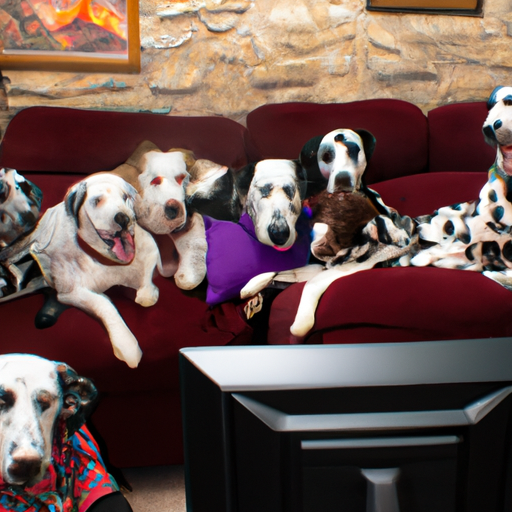As a pet caregiver, you’ve probably had moments where you’ve looked over at your dog, who seems to be watching the television with as much interest as you. It’s not just your imagination playing tricks on you. Recent studies suggest that dogs do indeed watch TV and even have preferences about what they watch. This article will delve deeper into the topic to answer the question – what TV shows do dogs like?
Table of Contents
- The Science Behind Dogs Watching TV
- What TV Shows Do Dogs Prefer?
- The Role of Breed and Individual Disposition
- TV Shows Designed Specifically for Dogs
- Frequently Asked Questions
Key Takeaways
- Dogs do watch TV and have specific show preferences.
- Dogs are more attracted to shows with animals, high contrast images and sounds that resemble those in nature.
- Certain dog breeds may have more interest in TV than others.
- There are TV shows and channels specifically designed for dogs.
The Science Behind Dogs Watching TV
Contrary to what some may think, dogs do not see TV the same way we do. Their perception of colors and the rate at which they process images is different from ours. Dogs see fewer colors and they process images at a faster rate. However, this doesn’t mean they can’t enjoy TV. In fact, a study from Psychology Today reveals that dogs can recognize images of other animals and even images of themselves on TV.
What TV Shows Do Dogs Prefer?
Not all TV shows are created equal in the eyes of your pooch. Dogs tend to prefer shows that feature other animals. They also respond well to shows with high contrast images and sounds that resemble those in nature. For example, a documentary about wildlife or a show about other dogs would be a hit with your fur friend. However, it’s important to remember that dogs primarily use their sense of hearing and smell, so shows that have interesting sounds and, surprisingly, smells can also capture their attention.
The Role of Breed and Individual Disposition
The breed of your dog and their individual disposition can play a significant role in their TV watching habits. For example, breeds that have been bred for hunting or herding might be more interested in shows that feature movement and action. Similarly, a dog that’s more laid-back may enjoy more relaxed programming.
TV Shows Designed Specifically for Dogs
In recent years, there has been an increase in TV shows and channels designed specifically for dogs. One such example is DogTV, which offers programming scientifically tailored to stimulate, entertain, and relax dogs. This might be a good option if you often leave your dog alone at home and want to provide them with some form of entertainment.
Frequently Asked Questions
1. Can watching TV harm my dog?
No, if done in moderation, watching TV will not harm your dog. However, it’s important to ensure that your dog also gets plenty of physical activity and isn’t just sitting in front of the TV all day.
2. How can I encourage my dog to watch TV?
Try to find shows that feature other animals, high contrast images, and sounds that resemble those in nature. You can also explore channels specifically designed for dogs like DogTV.
3. Are there dogs who just don’t like Television?
Yes, just like humans, dogs have individual preferences. Some might not show any interest in TV, and that’s perfectly okay.
As a pet caregiver, understanding what your pet enjoys can help you create a more enriching environment for them. Whether that includes TV shows or not, the effort you put into understanding your pet’s preferences will surely be appreciated by your furry friend.
To further enrich your understanding of dog behavior and preferences, you might want to check out these articles:
- Understanding Your Dog’s Body Language
- How to Keep Your Dog Entertained
- Understanding The Unique Personalities of Different Dog Breeds
Remember, every dog is unique and what works for one might not work for another. So, keep exploring, keep learning, and most importantly, enjoy your time with your canine companion.



